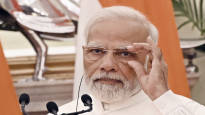Biden and Modi agreed on extensive economic cooperation and escalated the confrontation between the great powers even more, Asian correspondent Mika Hentunen estimates.
BEIJING Prime Minister of India Narendra Modi’s the visit to Washington was bittersweet Xi Jinping to the leading Chinese party and government apparatus.
China’s relations with its giant neighbor and the United States could also be described as frosty, if the word did not currently have a positive connotation in China.
In recent days, Beijing has suffered from extreme heat of over 40 degrees, in the middle of which everything cool would seem like a refreshing mirage.
That is not what Modi and US President Joe Biden sent to Beijing.
Great power relations are in a weak mess, even dangerously bad. The military forces of China and the United States have had “near misses” in recent months in the Taiwan Strait and in the South China Sea.
Modi and US President Joe Biden failed to convince the Chinese of their desire for peace in their press conference.
There was too much fresh plaque in the cavity. Biden angered the Chinese earlier this week by inviting the president and party leader Xi as a dictator.
China responded like a cannonball that it considered Biden’s speech a provocation and presented a protest to the White House.
Biden tried to explain the matter in the best way possible and guessed he hadn’t irreparable damage to his country’s relations with China. However, the damage had been caused, because in addition to China, among others, the US ally The New Zealand leadership was displeased Biden’s speeches.
Biden has known Xi for a long time, so naming him a dictator could have been a deliberate ploy. He knew he would infuriate Xi anyway during Modi’s visit, even with the actual substance.
Biden and Modi said they were starting a new era in their countries’ relations. They aim to reduce China’s global influence.
Like China and the US, the relationship between China and India is also characterized by competition for economic and political dominance and military intrigue. While speaking at the US Congress, Modi did not mention China by name, but the listeners understood who he was addressing.
– The dark clouds of military coercion and confrontation shadow the Indo-Pacific region. Maintaining balance there has become one of our key concerns, Modi said, referring to India-US relations.
Biden and Modi signed significant agreements increasing trade between their countries for example, semiconductors, minerals, and cooperation between the defense and space industries.
The United States will make it easier for Indians to obtain visas and India will remove the customs duties it imposed on the United States in recent years.
All these actions are hitting China’s wheel. India’s economy is the fifth largest in the world. It is still well behind China, but seems to be closing the gap.
India’s population will overtake China’s in the first half of this year, so it will the world’s largest country by population.
This has prompted the Chinese leadership to take action. Xi gave a speech in Mayin which he demanded, in addition to the development of industry, the improvement of the living conditions and quality of life of the population, and especially the improvement of the status of families with children.
According to forecasts, China will remain permanently behind India. Its population is about to decline from the current 1.4 billion.
More than the population, China’s leadership worries about the population age structure: According to forecasts, the proportion of people over 65 will rise from the current 13% to over 30% by 2050.
Caring for the elderly without undermining the country’s economic competitiveness requires reforms that have not been carried out in China before.
